
Dentures – Hamden, CT
A Tried and True Solution to Tooth Loss

If you have lost a number of teeth, you may be thinking about getting dentures. That is a wise call! Not only can dentures restore your ability to eat most foods, but they offer a number of other benefits as well. On this page, we expound more on what full and partial dentures are, how they work, and the advantages they offer. When you are ready to learn how dentures might help you, contact New Haven Dental Group in Hamden to schedule your restorative consultation.
Why Choose New Haven Dental Group for Dentures?
- Great attention to detail leads to predictable results
- Practice with more than 40 years of history
- Regain a highly functional set of teeth
What Are Full Dentures?

A full denture replaces an entire arch of lost teeth. It consists of a gum colored base and a full row of artificial teeth. Natural suction or a mild adhesive helps a full denture to stay in place during eating, drinking, and speaking.
What Are Partial Dentures?

As its name implies, a partial denture does not replace a whole arch of lost teeth. Rather, it fits around the remaining existing teeth to fill in the empty spaces. Small metal clips help a partial denture to stay in place.
How Do Dentures Work?

The denture process is fairly straightforward. First, our team evaluates your candidacy for the treatment. Then, we do any necessary preparatory work (for example, extractions or gum disease treatment). When your mouth is ready, we will take impressions of it and carefully design the size, shape, and color of your replacement teeth. A trusted dental laboratory will create your denture. When you come to our office to pick it up, we will give you some coaching on how to get the most out of it.
Who Is a Good Candidate for Dentures?

Whether you are missing a few teeth, several teeth, or all your teeth, dentures might be right for you. When you visit us for your consultation, we will gather information about your oral health, your medical history, and your expectations for treatment. From there, we will be able to make a well-informed recommendation as to whether dentures are appropriate for your unique case. Even if you are not immediately a candidate for dentures, you may become one after some preliminary care.
Effects of Missing Teeth

Missing teeth may be the result of genetics, past lifestyle choices, gum disease, accidents, or other factors. Regardless of the reason for edentulism (the state of being toothless), this condition can have profound consequences for your daily life.
For example, you may experience:
- Self-consciousness about your incomplete smile. This might cause you to shy away from social situations and make you miss out on meaningful interactions with others.
- Difficulty eating. You may have very limited food choices, which could prevent you from getting the nutrition that your body needs to thrive.
- Facial sagging. Without teeth to support your cheeks, you may look much older than you really are.
The good news is that dentures can help with such issues.
What Qualifies You for Dentures?

Dentures may be a good solution for you if you:
- Are missing one or more teeth.
- Have red or swollen gums due to eating without a complete set of teeth, or because your old dentures no longer fit well.
- Want an economical, reliable way to restore the function and appearance of your teeth.
- Have gums and a jawbone that are healthy enough to support a prosthetic. (If you have gum disease or other serious oral health conditions, these will need to be addressed before you receive dentures.)
Alternative Tooth Replacement Options
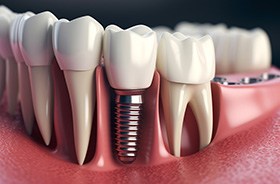
If dentures are not quite right for you, we may recommend an alternative tooth replacement option:
- Fixed bridge. Also known as crown and bridgework, a fixed bridge is held in place by two crowns that are attached to your remaining natural teeth. An artificial tooth spans the gap between them. Bridges can be very sturdy, aesthetically pleasing, and economical.
- Dental implants. Implants are small posts that replace the roots of lost teeth. They can support crowns, bridges, and dentures. We often recommend them as the best way to replace missing teeth because they are strong, long-lasting, and beneficial for jawbone health.
Types of Dentures
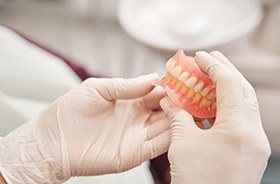
We offer three different types of dentures. During your consultation, we will recommend the one that is best for your unique case. Depending on your jawbone health and the extent of your tooth loss, we might inform you that a partial denture, full denture, or implant denture would be your best option.
Partial Dentures
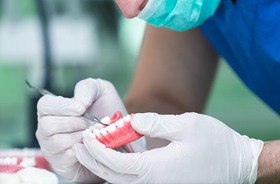
As its name implies, a partial denture does not replace a whole arch of lost teeth. Rather, it fits around the remaining existing teeth to fill in the empty spaces. Small metal or acrylic clips help a partial denture to stay in place.
Full Dentures
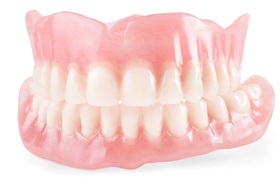
A full denture replaces an entire arch of lost teeth. It consists of a gum-colored base and a full row of artificial teeth. Natural suction or a mild adhesive helps a full denture to stay in place during eating, drinking, and speaking.
Implant Dentures
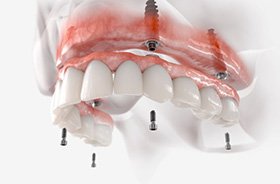
Implant dentures are supported by prosthetic tooth roots, which get surgically placed in the jawbone. As useful as traditional full and partial dentures are, their implant-retained counterparts are superior in a number of ways:
- They offer unrivaled stability and comfort.
- They help to preserve the jawbone’s size and shape.
- They have the potential to last for decades.
They look and feel almost exactly like natural teeth.
Benefits of Dentures and Partials
Traditional full and partial dentures offer some noteworthy benefits:
- With proper care, they can last for five years or longer
- They can be very natural-looking
- They can stand up to most foods
- As long as they fit well, they can be quite comfortable
Unique Advantages of Implant-Retained Dentures
As useful as traditional full and partial dentures are, their implant-retained counterparts are superior in a number of ways:
- They offer unrivaled stability and comfort
- They help to preserve the jawbone’s size and shape
- They have the potential to last for decades
- They look and feel almost exactly like natural teeth